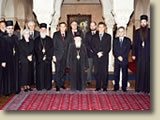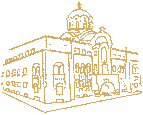| Information
Service of
the Serbian Orthodox Church
Oktober 7, 2004

OPEN
LETTER OF BISHOP ARTEMIJE OF RASKA-PRIZREN AND KOSOVO-METOHIJA
TO SERBIAN PRESIDENT BORIS TADIC
On October
5, 2004, Bishop Artemije of Raska-Prizren and Kosovo-Metohija
sent an open letter to Serbian president Boris Tadic in response
to his public appeal to Kosovo Serbs, calling on them to vote
in the upcoming Kosovo elections.
Esteemed Mr.
President:
What we have
awaited with trepidation for months, and discerned in our feelings,
we experienced this evening as an expected but very painful blow.
After so many discussions, consultations and advisory meetings
with so many people, despite swearing to a unified position with
regard to the Kosovo elections, you have acted like a free-shooter
and, contrary to everyone else, said what we all heard in your
address to the citizens of Serbia.
Did we not
tell you a week ago that should you decide to call on Kosovo Serbs
to vote, you should do so IN KOSOVO, face to face with these people.
We told you at that time that the least you could ask and demand
of the representatives of the international community is to allow
you to come to Kosovo to our refugee camps to see for yourself
how your people are living, and then call them to vote, if you
think that their living conditions are such that they can "freely
choose and be chosen". You have nevertheless chosen to do
so from Belgrade. For shame!
Today's date
for us Serbs in Kosovo and those who have been expelled from Kosovo
can only be compared with March 17 of this year. On that date
we experienced a pogrom at the hands of Albanian terrorists, and
today we are experiencing betrayal by the president of our homeland.
Your call has brought unrest to every heart, separation and division
among the Serbian people, both in Belgrade and in Kosovo and Metohija.
A few days
ago you said that you would never be a signatory to an independent
Kosovo. Perhaps you will not be, because no one will ask for your
signature. But it is certain that your methods and deeds, first
and foremost, today's gesture will contribute to this coming to
pass, in the same manner as that of your predecessors in this
position. They did not sign anything, either, but with their deeds
and THEIR erroneous policies they brought us into the position
where we are today. You are surely completing their handiwork.
History will record this, and God will repay everyone according
to their deeds.
It is with
deep regret that you have forced us to write this letter that
we remain deeply disappointed.
Bishop
of Raska-Prizren and Kosovo-Metohija
+ARTEMIJE

RESTORATION
OF CHILANDAR MONASTERY
 His
Holiness Serbian Patriarch Pavle together with members of the
Holy Assembly of Bishops: His Grace Bishop Irinej of Nis, His
Grace Bishop Jovan of Sumadija, and His Grace Bishop Joanikije
of Budimlje and Niksic received Mr. Vojislav Kostunica, the prime
minister of the Republic of Serbia; and Mr. Dragan Kojadinovic,
the minister of culture and media, and assistant minister for
capital investments. The meeting was also attended by Ms. Gordana
Markovic, the director of the Serbian Institute for the Protection
of Cultural Monuments; Dr. Mirko Kovacevic, the architect participating
in the restoration of Chilandar Monastery; and Mr. Slobodan Mileusnic,
the director of the Serbian Orthodox Church Museum, and coordinator
of the Serbian Orthodox Church’s Committee for protection and
restoration of churches and monasteries. His
Holiness Serbian Patriarch Pavle together with members of the
Holy Assembly of Bishops: His Grace Bishop Irinej of Nis, His
Grace Bishop Jovan of Sumadija, and His Grace Bishop Joanikije
of Budimlje and Niksic received Mr. Vojislav Kostunica, the prime
minister of the Republic of Serbia; and Mr. Dragan Kojadinovic,
the minister of culture and media, and assistant minister for
capital investments. The meeting was also attended by Ms. Gordana
Markovic, the director of the Serbian Institute for the Protection
of Cultural Monuments; Dr. Mirko Kovacevic, the architect participating
in the restoration of Chilandar Monastery; and Mr. Slobodan Mileusnic,
the director of the Serbian Orthodox Church Museum, and coordinator
of the Serbian Orthodox Church’s Committee for protection and
restoration of churches and monasteries.
On the basis
of a report by Bishop Irinej of Nis, who just returned from a
visit to the damaged Chilandar Monastery, it was emphasized at
the meeting that work on restoration is progressing slowly but
that with faith in God everyone hopes that with the cooperation
of the two Churches of Serbia and Greece work will speed up. Bishop
Irinej asked all present to do everything in their power to complete
what has been started, stating that inexcusably little has been
done so far and that the tempo of work must significantly increase.
Minister
Kojadinovic emphasized that the Government will continue to provide
funds and that the Greek Ministry of Culture has promised to intervene
to ensure that work on restoration is speeded up. Prime Minister
Kostunica emphasized that it is necessary to make list of priority
tasks.

FIRST
SERBIAN UPRISING IN MONTENEGRO AND HERZEGOVINA AND CHRISTIAN EUROPE
(1804-1813)
An international
academic conference on “The First Serbian Uprising in Montenegro
and Herzegovina and Christian Europe (1804-1813)” organized by
the Diocese of Montenegro and the Littoral will take place in
Ostrog Monastery and Podgorica from October 8-10, 2004.
On Friday,
October 8, 2004, His Eminence Metropolitan Amfilohije of Montenegro
and the Littoral, who also the president of the Committee for
commemoration of the bicentennial of the First Serbian Uprising
in Montenegro, will open this highly significant academic gathering
in the refectory hall of Ostrog Monastery. After his welcoming
remarks Metropolitan Amfilohije will present a lecture on “St.
Peter of Cetinje, Karageorge, Makriyannis – Orthodox spiritual
ethos”. Professor Dr. Rados Ljusic will speak about “Secular and
spiritual leaders of the Serbs during the time of the Serbian
Revolution”. The third lecturer will be academician Miomir Dasic
on “Political and military cooperation between the Montenegro
of Metropolitan Petar I Petrovic Njegos and the mountain clans
with Karageorge’s Serbia, 1804-1813. This part of the conference
will conclude with the lecture of a guest from Greece, Professor
Dr. Panaiotis Haritos on “Rigas Konstantinos and the liberation
of the Christian peoples in the Balkans”. The second session will
begin with Professor Dr. Radoman Jovanovic’s speech on “Influence
of the external factor on the policies of Metropolitan Petar I
toward the First Serbian Uprising, 1804-1813”. Dr. Konstantin
Nikiforov from Moscow will then speak about “Russian ties with
Serbia and Montenegro during the First Serbian Uprising as the
model for their future relations”. The speaker after the guest
from Russia will be Dr. Vladimir Jovanovic on “Metropolitan Petar
I and Karageorge – face to face” followed by academician Dragutin
Lekovic’s discussion on “First Serbian Uprising in light of the
philosophy of history”.
On Friday,
October 8, 2004 the afternoon session beginning at 3:30 p.m. will
start with Bishop Atanasije’s lecture on “Participation of the
Herzegovians in the First Serbian Uprising” followed by Dr. Slavenko
Terzic on “Old Herzegovina and the idea of the resurrection of
the Serbian state”, Dr. Radoslav Raspopovic on “Petar I’s plan
for engagement of the Montenegrin-Bay of Boka and Russian armies
in Herzegovina and the program for creation of a Slavic Serbian
state under the auspices of Russia”, and Vasko Kostic on “Serbian
uprising (1804-1813), surrounding Serbian regions and Christian
Europe”. The academic conference will continue with Zarko Lekovic’s
lecture on “Montenegrin-Serbian cooperation, 1804-1813” and Luka
Kastratovic on “Karageorge’s Rasko-Polimska offensive in 1809
(military aspect)”. This part of the session will conclude with
Dr. Branko Nadoveza’s lecture on “Balkans and Balkan peoples during
the First Serbian Uprising with special consideration of Montenegro
and Herzegovina”.
On
Saturday at 9:00 a.m. the first speaker in the conference room
of the Ljubovic Hotel in Podgorica will be Dr. Jovan Delic on
“Vuk, Europe and the Serbian language”, followed by Dr. Zoran
Mirkovic on “Sources of the Code of Karageorge”, and Vukic Ilincic
on “Serbia under the Nemanjic dynasty and Karageorge as the basis
of the national program of Prince-King Nikola”. Dr. Radmilo Marojevic
will then present his lecture on “The Dedication: critical edition
and poetic structure of the text” [1] just before the break. After
the discussion Dr. Veselin Djuretic present a lecture on “Serbdom
in light of the First Serbian Uprising”, followed by Professor
Dr. Dimitrije Kalezic on “Karageorge’s rebellion in light of the
Revelation of John”, Professor Dr. Alojz Ujes on “Archimandrite
Ruvim of Bogovadja Monastery on the stage of the Imperial Theatre
of Vienna in 1849”, and Professor Predrag Vukic on “Drina River
as a motif of rebellion in the First Serbian Uprising and the
spirit of freedom tradition of the Serbian people”. On Saturday
the fourth and final session of the conference will begin at 3:30
p.m. with a lecture by academician Ljubomir Zukovic on “Marko
Miljanov on the First Serbian Uprising”, followed by Budimir Aleksic
on “Folk poems about the First Serbian Uprising and ‘The Serbian
Mirror’” [2]. Dobrilo Aranitovic will continue on “Poetry and
historiosophy [sic] of rebellion (Visnjic-Sarajlija-Njegos)”,
and Mihailo Scepanovic on “Montenegro and Vuk’s adages” [3]. After
the discussion Presbyter Velibor Dzomic will speak on “Karageorge’s
faith and religious devotion”, followed by Bojana Miskovic on
“Pushkin on Karageorge and Montenegro”, Ana Pejanovic on “The
Dedication: Russian poetic renditions”, and finally, Dr. Jovan
Cadjenovic on “Momir Vojvodic's poem ‘Leader of Serbia’”.
-----------
1.
Reference to the introductory poem of The Mountain Wreath of Petar
II Petrovic Njegos, “Dedicated to the Ashes of the Father of Serbia”,
i.e. Karageorge.
2. In 1845 Njegos published a collection of folk poems entitled
Ogledalo Srpsko (Serbian Mirror).
3. Narodne Poslovice (Folk Adages) by Vuk Karadzic published in
1836.
[All
titles have been translated from Serbian.]

[Serbian
Translation Services]

Copyright © 1999-2004 by
The Information Service of
the Serbian Orthodox Church
11000 Belgrade
Kralja Petra I no.5
+381 11 3282 596
e-mail
|

